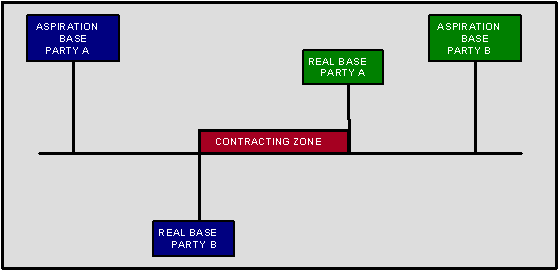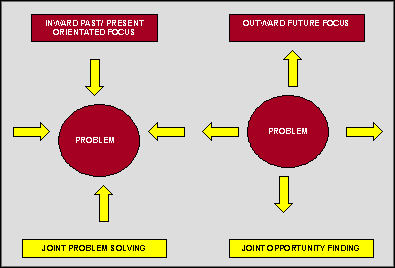| Mutually Acceptable Agreements - Negotiation Guide (Part 1) |  |
| Discover how to gain a better mutual negotiation outcome by understanding the positions of both negotiating parties. 5 general guidelines on how to enhance your agreements. |
If you could rapidly discover the 20% that would reward you with 80% of the results you want to achieve in any negotiation, would you take 15 minutes of your time to learn how? In this article I focus on the Pareto principle to provide you with my 10 top secrets to help your negotiation success.
Many managers advise us that time pressures prevent them from participating in a quality negotiation course. They canot not find those quiet moments to fully delve into the complexities covered in many negotiation books. Other busy business people who are under great pressure crave a "crib-sheet" that they refer to prior to the crunch of that all important negotiation. While it's certainly true that a negotiator who has trained properly and who is fully prepared will inevitably gain an edge over those who merely skim the issues, it would be nonethless helpful to have a top 10 guidance sheet. These lessons are not to be considered as a panacea 'cure all', so please contact us directly should your negotiation challenges not be adequately addressed in this article.
Having been involved in negotiations for many years, I have had the opportunity to repeatedly experience the most important factors of a successful negotiation. Without suggesting that these ten lessons constitutes a fail-safe recipe, I do believe that they will, if used correctly, significantly enhance the negotiation performance of a manager.
Lesson 1 - Know your Aspiration Base
Regretably, many managers commence a negotiation without clearly defining the optimal goal they wish to achieve in that negotiation, or else they aspire to a goal which is much too low. This invariably results in an ineffectual outcome that is significantly less than what could have been achieved. The reason is due to their low aspiration target and is will very likely be diminished by the concessions they will need to make to advance the negotiation. The psychological consequences and and lack of expectation often results in little more than a split-the-difference exercise.
Negotiators need to comprehend that the primary target they set is actually the outer limit of what they might otherwise achieve. It is unlikely that this outcome will reach beyond this target. It will in fact only move the opposite direction. Furthermore, a negotiator needs to appreciate that their aspiration base will determine the other party's minimum expectation.
Remember:
|
Lesson 2 - Know your Real Base
As crucial as it is to establish a high aspiration base, negotiators must also know when it's best to walk away from the negotiations. If you do not clearly definine this point beforehand, then you will likely have a tendency to stay in the negotiation beyond the point where it is reasonable. Trying to determine this point as the negotiation progresses is very dangerous because it may then be psychologically very difficult to act against the flow.
Know what you must achieve if the negotiation is not to be an exercise in self-destruction.
Remember:
|

Lesson 3 - Know your Best Alternative to a Negotiated Agreement
Before commencing a negotiation it is vital that a negotiator establishes what their BATNA would be should an agreement not materialize. Where would the walk-away point leave a negotiator in terms of satisfying their interests? What alternative option exists that would satisfy their interests? Unless a negotiator is very clear on whether they can walk away from the negotiation table and the options available to them if they should, they will find themselves to be very pressed to reach an agreement. In turn, they will then become pessimistic about the consequences should the negotiation collapse. A strong BATNA permits a negotiator to be firm when negotiating, and gives them the power and confidence they need to step back from a negotiation when a mutually beneficial agreement is not possible.
A BATNA is the best outcome a negotiator can hope for if the negotiation ends in an stalemate. As Fisher and Ury (1981: 104, 111) explain it, "the standard against which any proposed agreement should be measured" as it "determines what a minimally acceptable agreement is" . In the case of an employment offer, their BATNA could represent an alternative employment offer.
Remember:
|
Lesson 4 - Focus on Interests not Positions
Negotiators usualy start a negotiation with predetermined positions underscored by one or more interests - basic needs, fears, desires, hopes, expectations, etc.Whereas positions represent an approach they have decided to adopt, interests are that which gave rise to their decision to adopt certain positions. Merely therefore focusing on positions in a negotiation invariably causes a protracted I vs. I tug of war, where the parties try to drag each other towards their positions. The result is usually an impasse or a win-lose outcome.
The challenge for negotiators is to look beyond the positions initially communicated and to uncover and explore the interests that gave rise to these positions. Once the parties have explored their respective interests, they very often are able to agree an outcome not initially contemplated by either, but which satisfies their respective interests far better than a long drawn-out test of strength.
When parties are aware of each other's interests they more often than not discover that the interests they share considerably outweigh their conflicting interests and that it is possible to mould their common interests into a Win More! mutually acceptable agreement by working together.
Remember:
|

Lesson 5 - Check your Assumptions - They tend to be Wrong
One of the greatest dangers negotiators face is their tendency to assume certain things without checking that these assumptions are correct. This very often not only leads to the other party being framed in a particular way, but also results in inappropriate attitudes and behaviour that prevent a mutually beneficial agreement from being concluded. Where two parties, a developer and an environmentalist, are for example negotiating an industrial development near a very sensitive wetland, and the developer believes the environmentalist is, as are all environmentalists, part of a lunatic fringe that is hell-bent on preventing all development, this will strongly influence how the developer approaches the environmentalist. Although the developer's assumption may be totally unfounded, it unfortunately could, as all too often happens, become a self-fulfilling prophecy, as it is likely to compel the environmentalist to act accordingly.
Remember:
|
[Part 1] [Part 2]
Back to Negotiation Articles
We welcome the republication of this page's contents in part or full - we just ask that you include a clean link back to this site, to our www.negotiationtraining.com.au/training/ page.
|
Reader Comments
Average Reader Rating:
share your comment |
|
|
|






Reader Comments
Average Rating:
Total Comments: 1